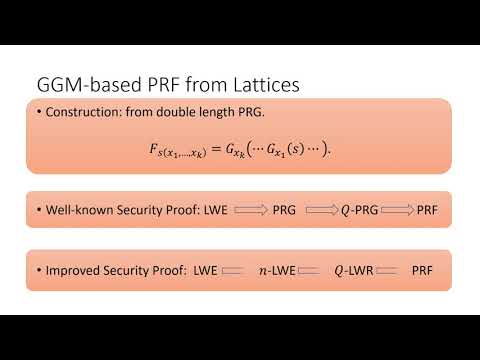CryptoDB
Almost Tight Security in Lattice with Polynomial Moduli - PRF, IBE, All-but-many LTF, and More
| Authors: | |
|---|---|
| Download: | |
| Abstract: | Achieving tight security is a fundamental task in cryptography. While one of the most important purposes of this task is to improve the overall efficiency of a construction (by allowing smaller security parameters), many current lattice-based instantiations do not completely achieve the goal. Particularly, a super-polynomial modulus seems to be necessary in all prior work for (almost) tight schemes that allow the adversary to conduct queries, such as PRF, IBE, and Signatures. As the super-polynomial modulus would affect the noise-to-modulus ratio and thus increase the parameters, this might cancel out the advantages (in efficiency) brought from the tighter analysis. To determine the full power of tight security/analysis in lattices, it is necessary to determine whether the super-polynomial modulus restriction is inherent. In this work, we remove the super-polynomial modulus restriction for many important primitives – PRF, IBE, All-but-many Lossy Trapdoor Functions, and Signatures. The crux relies on an improvement over the framework of Boyen and Li (Asiacrypt 16), and an almost tight reduction from LWE to LWR, which improves prior work by Alwen et al. (Crypto 13), Bogdanov et al. (TCC 16), and Bai et al. (Asiacrypt 15). By combining these two advances, we are able to derive these almost tight schemes under LWE with a polynomial modulus. |
Video from PKC 2020
BibTeX
@article{pkc-2020-30302,
title={Almost Tight Security in Lattice with Polynomial Moduli - PRF, IBE, All-but-many LTF, and More},
booktitle={Public-Key Cryptography – PKC 2020},
series={Public-Key Cryptography – PKC 2020},
publisher={Springer},
volume={12110},
pages={652-681},
doi={10.1007/978-3-030-45374-9_22},
author={Qiqi Lai and Feng-Hao Liu and Zhedong Wang},
year=2020
}

